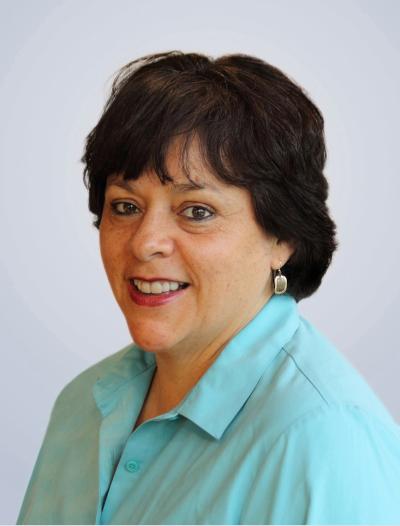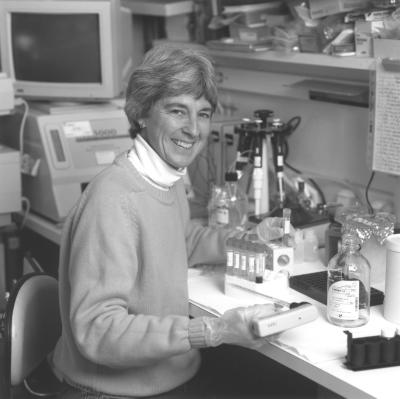WSA Celebrates Legacy of Anita Roberts
NIAID’s Carolina Barillas-Mury to Present the 2024 Anita B. Roberts Lecture
BY MUNA FUYAL, NCI

CREDIT: CAROLINA BARILLAS-MURY
Carolina Barillas-Mury
Join the Women Scientists Advisors (WSA) in celebration of the scientific contributions of Carolina Barillas-Mury at the 2024 Anita B. Roberts Lecture, which will take place November 14, 12–2 p.m., live on VideoCast. Barillas-Mury is chief of the Laboratory of Malaria and Vector Research at NIAID and a distinguished investigator and head of the Mosquito Immunity and Vector Competence Section. Her lab investigates the interactions between the mosquito immune system and Plasmodium parasites to understand how these interactions affect malaria transmission to disrupt the parasite’s life cycle and prevent human disease.
Barillas-Mury’s path to studying mosquito immunity began when she joined the laboratory of Michael Wells at the University of Arizona (Tucson, Arizona) for her doctoral research. Born in Guatemala in 1961, Barillas-Mury graduated from medical school at Universidad Francisco Marroquín de Guatemala in 1985 and wanted to explore biology at the molecular level.
Driven by her medical background in human health in tropical regions, her doctoral research on mosquitoes described the enzymatic processes behind mosquito blood-meal digestion. She continued her training as a postdoctoral scholar with Fotis Kafatos at Harvard University (Cambridge, Massachusetts) and the European Molecular Biology Laboratory (Heidelberg, Germany). She became an assistant professor at Colorado State University (Fort Collins, Colorado) in 1998 and then joined NIH as a tenure track investigator in 2003. She was promoted to senior investigator in 2010 and NIH distinguished investigator in 2016, an honor reserved for NIH’s most preeminent senior investigators.
Her continued scientific leadership in understanding the mosquito immune defenses and malaria parasite coping mechanisms has been accoladed by national and international scientific bodies. She was awarded the 2010 Bailey K. Ashford Medal from the American Society of Tropical Medicine and Hygiene, and the 2013 Sanofi-Institut Pasteur Award in Tropical and Neglected Diseases. She was elected to the National Academy of Sciences in 2014 and National Academy of Medicine in 2021, and was recognized among the 2017 Alumni of the Year of the University of Arizona. Barillas-Mury became a fellow of the American Society of Tropical Medicine and Hygiene in 2017 and of the Entomological Society of America in 2020.
In addition to being a scientific leader in the field, Barillas-Mury also is a passionate advocate for women and underrepresented minorities in biomedical research. She was a member of the National Academy of Science Section 44 Temporary Nominating Group from 2016 to 2023 to promote the nomination of women and other underrepresented groups in NAS.
“It is essential to find joy in your work and inspire the next generation with your enthusiasm for science, ensuring a continuous pursuit of truth as we navigate an ever-growing sea of information and misinformation,” said Barillas-Mury, who will deliver a talk titled “Mosquito Immunity and Malaria Transmission.”
It comes as no surprise that Barillas-Mury is an admired mentor to her trainees. “Dr. Barillas-Mury is a beacon of scientific integrity and mentorship,” said Yeon-Soo Han, who was a postdoctoral fellow in her lab from 1998–2003. “Her commitment to advancing science while nurturing the next generation of scientists including myself is truly inspiring.”
Muna Fuyal is a postdoctoral fellow in the NCI Laboratory of Integrative Cancer Immunology with Remy Bosselut. She also serves as the NCI representative for WSA’s Women Scientist Fellows. In her spare time, she enjoys hiking and watching futball. Carrie Mae Long, NIAID, also contributed to this article.
Catch the 2024 Anita B. Roberts Lecture on November 14, 12–2 p.m., live on NIH VideoCast.
About Anita Roberts

CREDIT: WSA
Anita Roberts
The Anita B. Roberts lecture is an annual event sponsored by the NIH Women Scientists Advisors to highlight the outstanding achievements of NIH women scientists. The lecture’s namesake, Anita Roberts, led an illustrious career as a scientist and mentor at NIH. Roberts earned her doctorate in biochemistry from the University of Wisconsin at Madison. Before joining the NIH, Roberts trained as a postdoctoral fellow at Harvard University and held several scientific positions at Aerospace Research Applications Center and Indiana University at Bloomington. She joined NCI in 1976 and later promoted to chief of the Laboratory of Cell Regulation and Carcinogenesis.
Roberts’ major scientific contributions include the characterization of transforming growth factor-beta in the context of wound healing and cancer. With over 100,000 citations, Roberts is one of the top-cited women scientists of all time. In addition to her scientific success, Roberts was an excellent mentor to her trainees and coworkers. The Anita B. Roberts Lecture Series serves as a testament to her continuing legacy and highlights the importance of fostering a supportive workplace.
This page was last updated on Tuesday, November 5, 2024
